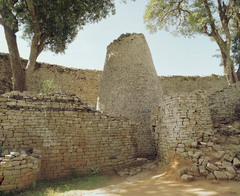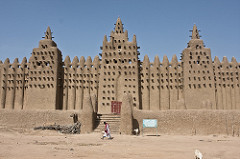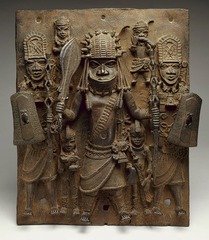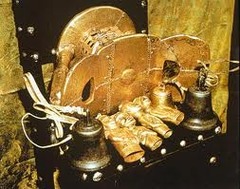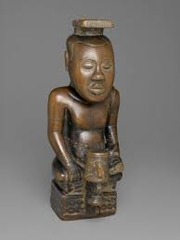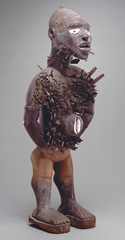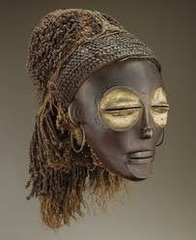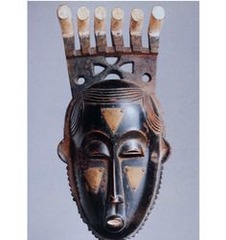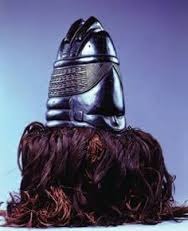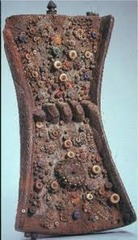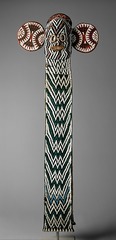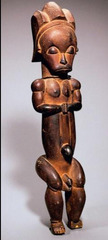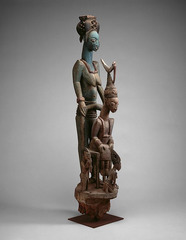Conical Tower of Great Zimbabwe
Location: Southeaster Zimbabwe- Shona people
Date: 1000-1400 CE
Medium: Coursed Granite Blocks
prosperous trading center and royal complex
stone enclosure probably royal complex
walls 30 feet high
modeled on traditional shapes of grain silos
Great Mosque of Djenne
Location: Mali
Date: Founded 1200CE
Rebuilt 1906-1907 CE
Medium: Adobe
yearly festival where whole community reapplies adobe to structure
still in use today
Wall Plaque from the Oba's Palace
Location: Benin (Nigeria)- Edo Peoples
Date: 16th Century
Medium: Cast Brass
range in size due to their specific ranking.
hierarchy of scale
Golden Stool (Sika dwa kofi)
Location: South central Ghana- Ashanti peoples
Date: 1700 CE
Medium: Gold over wood pain and cast gold attachments
similar to idea of elijahs chair- meant for the spirits
said to house the spirit of the Ashanti nation.
came down from the sky because of
some people of high status, and it landed on the first Asante king's lap.
Ndop (portrait figure) of King Mishe
Location: Democratic Republic of the Congo- Kuba ppl
Date: 1760-1780 CE
Medium: Wood
These figures were said to represent the spirit of the nyim(Kuba king) and be used as a
point of reference towards it. These figures were rubbed with oil if the king wasn't
present in the capital.The head is bigger because it is a seat of intelligence.
Power Figure (Niksi n'kondi)
Location: DR of Congo- Kongo peoples
Date: late 19th century
Medium: wood and metal
loosely translated to a 'spirit' yet it is represented as a container of sacred
substances which are activated by supernatural forces that can be summoned into the physical world
Female (pwo) mask
Location: DR of Congo- Chokwe peoples
Date: late 19th- early 20th century
Medium:wood, fiber, pigment, and metal
Honors founding female ancestors
often performed at the celebrations that mark the completion of initiation into adulthood.
Portrait mask (mblo)
Location: Cote d'Ivoire- Baule peoples
Date: early 20th century
Medium: wood and pigment
Balanced symmetry
● Stability
● Calm
● Beauty
● Downward eyes suggest a sense of introspective
High foreheads suggest intellectual enlightenment
Bundu mask
Location: Sierra Leone and Liberia- Sande society, Mende poeples
Date: 19th-20th century
Medium: wood, cloth, and fiber
Fertility
● Along with the accompanying long body
costume that they have to wear, it disguises the
body completely
● Serenity (half closed eyes, soft contours)
Used to exercise justice for Sande female society. Also worn when being initiated into the society.
Ikenga (shrine figure)
Location: Nigeria- Igbo peoples
Date: 19th-20th century
Medium: wood
expressed personal spirit aka chi
visualizes leadership
horns refer to powerful and aggressive nature of a ram
Lukasa (memory board)
Location: DR of Congo- Mbudye society Luba peoples
Date: 19th-20th century
Medium: wood, beads, and metal
The purpose was to illustrate the Luba political system, history of the state, and territorial diagrams of local chiefdoms. Therefore, its overall function was to give a visual map of the fundamental aspects of the Luba culture.
Aka Elephant Mask
Location: Cameroon- Bamileke
Date: 19th-20th century
Medium: wood, woven raffia, cloth and beads
It was worn by the royalty, wealthy title holders, and important warriors. These
masks are used for funeral ceremonies or for public celebrations of kingship that would display
the wealth and power of that kingdom. They would dance in a costume with the mask on during the different ceremonies. These costumes were very elaborate like the mask; they contained a red feather headdress, leopard skin cape, and a full body costume.
Reliquary figure (byeri)
Location: Southern Cameroon- Fang peoples
Date: 19th-20th century
Medium: wood
It was intended to ward off those that might harm the contexts of that box or as a warning.
Veranda Post of Enthroned King and Senior Wife (Opo Ogaga)
Location:Nigeria- Olowe of Ise (Yoruba peoples)
Date: 1910-1914 CE
Medium: wood and pigment
It faced visitors in the outer palace courtyard of Ise. It was the center of attension at the palace.
The size and strength of the senior wife suggests the importance of women in Yoruba society.
